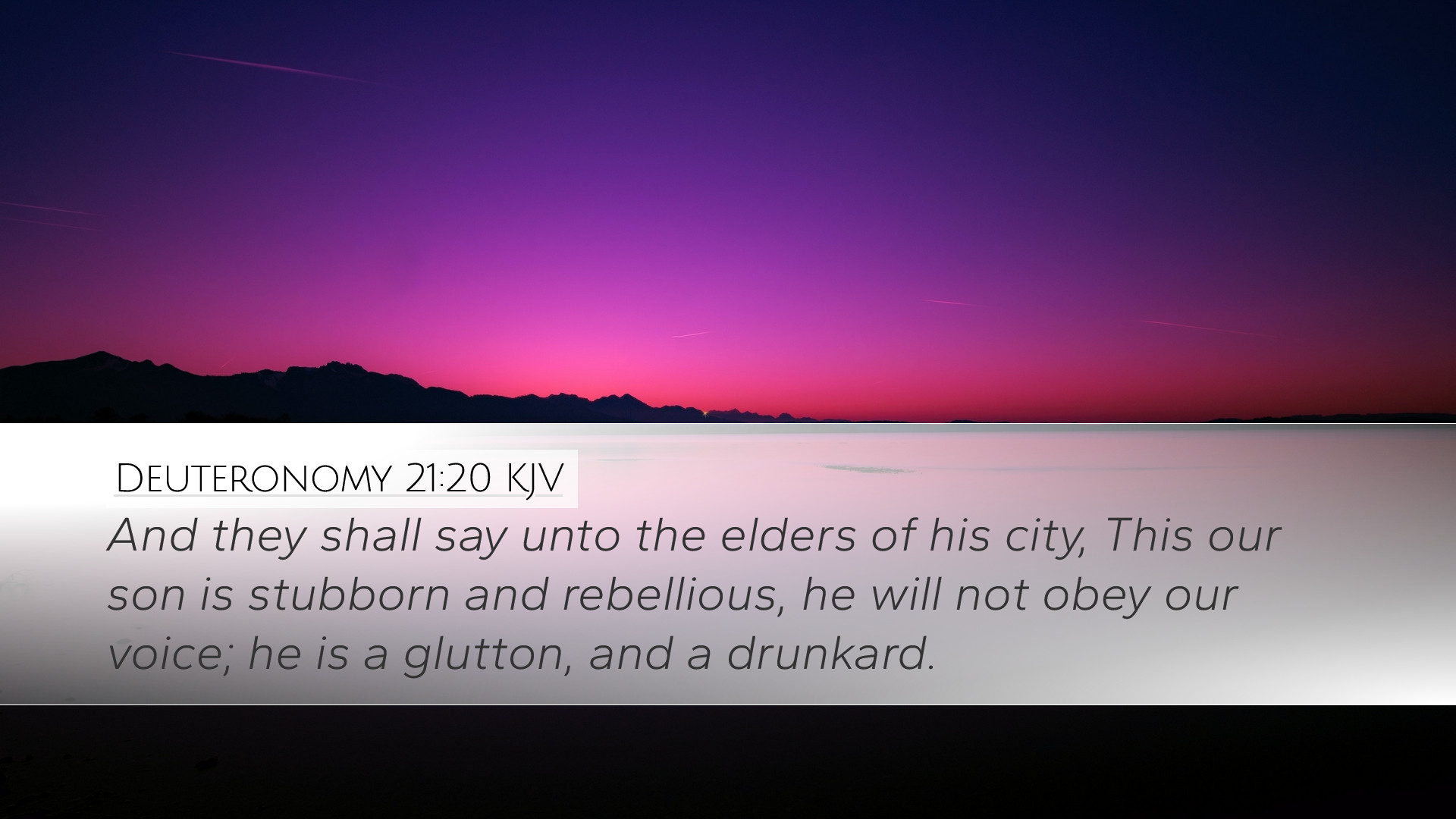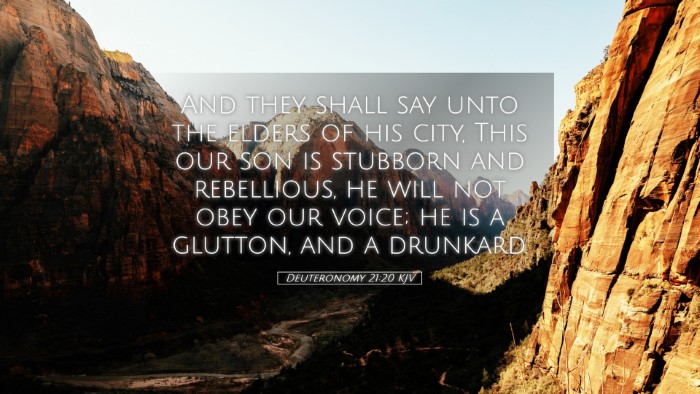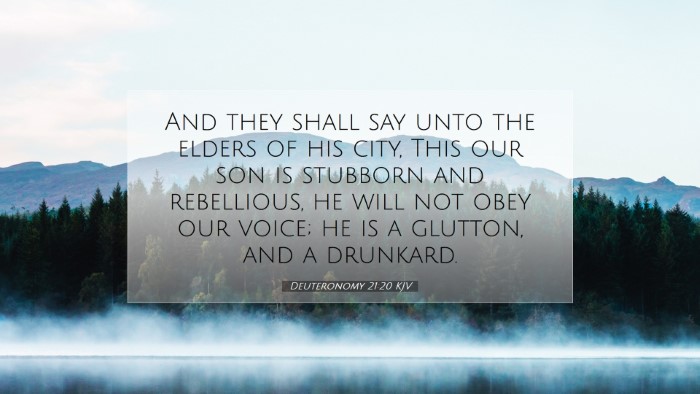Commentary on Deuteronomy 21:20
Verse: "And they shall say unto the elders of his city, This our son is stubborn and rebellious, he will not obey our voice; he is a glutton, and a drunkard." - Deuteronomy 21:20 (KJV)
Contextual Overview
This passage is part of a larger legal framework presented in Deuteronomy concerning family and societal order. It highlights the severe consequences of rebellion and disobedience within the familial unit, particularly concerning children who do not heed parental authority.
The Nature of Rebellion
The initial part of this verse—“This our son is stubborn and rebellious”—foregrounds the nature of the offense. According to Matthew Henry, this stubbornness signifies a deep-rooted unwillingness to submit to authority which reflects a larger spiritual condition that is displeasing to God.
Stubbornness and Rebellion
- Stubbornness: The Hebrew term conveys the notion of obstinacy, indicating a refusal to change one’s behavior or attitude.
- Rebellion: This indicates not just a momentary act of defiance but a persistent pattern of disobedience that establishes a lifestyle contradictory to parental or societal expectations.
Albert Barnes elaborates that such a character not only disobeys his parents but also disrupts the moral fabric of the community. This behavior, if left unchecked, could lead to a broadening of its negative influence among peers, echoing the sentiments of Adam Clarke regarding communal sanctity and order.
Obedience to Parental Authority
The phrase “he will not obey our voice” underlines the critical role parental authority plays in the upbringing of children. Matthew Henry asserts that obedience to parents is a sign of respect and acknowledgment of their God-given authority. The refusal to obey draws a line of distinction between a child who remains under the protective guidance of parental wisdom and one who rejects it.
Importance of Obedience
- Spiritual Responsibility: The act of obedience is not just for social conformity; it has spiritual implications, reflecting a child’s understanding of God’s order.
- Consequences of Disobedience: Children who do not heed wise counsel risk not only their own well-being but potentially harm the family’s standing within the community.
Characterization of the Rebellious Son
Further, the verse describes the son as “a glutton and a drunkard,” which indicates not merely a lifestyle of indulgence but is emblematic of moral decay. The terms employed illustrate a character steeped in excess, reflecting an unrestrained appetite for both food and drink that leads to a degenerate lifestyle.
Moral Implications of Excess
- Gluttony: Represents an attitude toward life's pleasures that is self-indulgent and devoid of moderation, which can lead to physical and spiritual ruin.
- Drunkenness: A sign of a lack of self-control; in the Biblical context, it can also symbolize a spiritual numbness and separation from God’s wisdom.
Albert Barnes comments that such indulgences reflect a blatant disregard for God’s commandments regarding moderation and self-discipline—qualities necessary for any individual who wishes to lead a life aligned with God’s desires.
Social and Legal Context
This passage ties into Mosaic Law’s provisions regarding family and societal order. The consequences for such rebellion were severe; it was not simply a matter of family discord but rather a matter of community welfare. Adam Clarke views this decree as an urgent communal warning against the breakdown of societal values, asserting that when a child rejects their family’s guidance, they pose a risk to the entire community.
Community Responsibility
- Collective Action: The elders are summoned to consider the gravity of the situation, indicating that communal engagement is crucial in addressing individual family issues.
- Preservation of Values: It illustrates the necessity for communal action to maintain moral and social order—a clear expectation in the framework of Biblical community practices.
Theological Reflection
In deeper theological terms, this verse can be seen as a sinister foreshadowing of the consequences of sin and disobedience. God’s instructions towards family discipline underscore the foundational value of authority—both literal and divine. Henry suggests the metaphorical consequences of rebellion point toward the spiritual disfavor one incurs in dismissing God’s laws.
Spiritual Disobedience and Consequences
- Separation from God: Rebelliousness breeds spiritual death, as it creates a gulf between the individual and God’s intended path.
- Community Impact: Sin's impact stretches beyond the personal-it reverberates through families and communities, undermining the very fabric of communal faith.
Practical Applications
Pastors and educators may reflect on this poignant warning from Deuteronomy in their teachings and counseling by considering current societal norms that promote rebellion against authority, especially parental values. Analyzing this text allows leaders to address contemporary issues of youth disobedience with biblical depth.
Strategies for Engagement
- Fostering Open Dialogue: Encourage discussions in families about respect for authority and the importance of obedience.
- Modeling Behavior: Leaders should serve as examples of godliness, demonstrating disciplined lifestyles that reflect the teachings of scripture.
- Community Support: Cultivating environments where accountability is welcomed rather than shunned can help in addressing issues of rebellion in an open, loving manner.
Conclusion
Deuteronomy 21:20 serves as a solemn reminder of the tension between personal freedom and societal responsibility—a theme that remains crucial for pastors, theologians, and scholars today. It calls for proactive engagement with the youth, fostering values of respect and obedience that align with divine principles, ensuring the preservation of godly order within families and communities.


